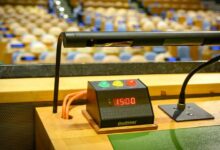Indian minister says ‘we can change the world for the better’
 India’s External Affairs Minister Subrahmanyam Jaishankar said the world stands fractious, polarized and frustrated amid war, unfair trade practices, climate change and food and health insecurity. Trust has eroded, processes have broken down and countries have extracted more from the international system than they have put in it, enfeebling it along the way.
India’s External Affairs Minister Subrahmanyam Jaishankar said the world stands fractious, polarized and frustrated amid war, unfair trade practices, climate change and food and health insecurity. Trust has eroded, processes have broken down and countries have extracted more from the international system than they have put in it, enfeebling it along the way.
“Conversations have become difficult, agreements even more so,” he said. “This is surely not what the founders of the UN would have wanted for us. Reforming multilateralism is, therefore, an imperative.”
The General Assembly must ask itself “how has this come to pass?” he said.
“Every change must begin somewhere, and there is no better place than where it started,” he continued.
“We, the Members of the United Nations, must now seriously and purposefully address ourselves to that task. If we carry on like this, the state of the world is only going to get worse, and that could mean that more of us are going to be left behind.
For its part, India has sought to respond in a variety of ways, including targeted policies and initiatives focused on issues of the vulnerable, women, farmers and youth, from assured access to piped water, electricity, cooking gas and new homes to financial support for food producers.
India has also expanded employment and entrepreneurship opportunities, created digital infrastructure for public services and convened three Global South summits while also responding to pressing needs in 78 nations.
“In these troubled times, it is necessary to provide hope and rekindle optimism,” he said.
“When India lands on the moon, rolls out its own 5G stack, dispatches vaccines worldwide, embraces fin-tech or houses so many Global Capability Centres, there is a message here. Our quest for a Viksit Bharat, or developed India, will understandably be followed closely.”
However, challenges persist, he said, underscoring that many countries get left behind due to circumstances beyond their control. But some make conscious choices with disastrous consequences, with one example being neighbouring Pakistan, “a dysfunctional nation coveting the lands of others”. As such, he stressed, “Pakistan’s cross-border terrorism policy will never succeed.”
When it comes to deciding on key issues, large parts of the world cannot be left behind, he said, emphasising that an effective, efficient UN must be more representative and fit for purpose.
“Let us, therefore, send out a clear message from this UN General Assembly session: we are determined not to be left behind,” he said. “By coming together, sharing experiences, pooling resources and strengthening our resolve, we can change the world for the better.”



